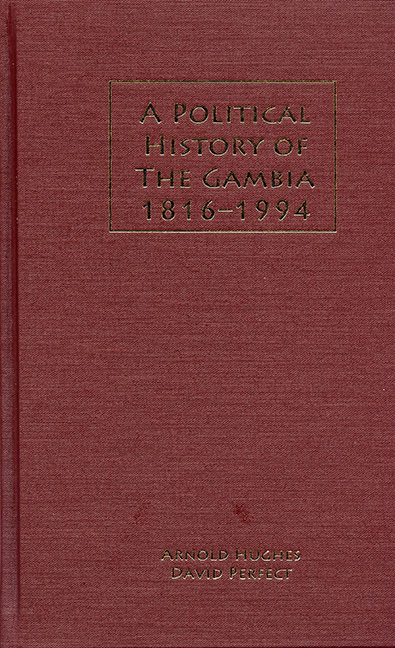Book contents
- Frontmatter
- Dedication
- Map
- Contents
- List of Tables
- List of Interviewees
- Acknowledgments
- Abbreviations
- Introduction
- 1 Social and Economic Setting
- 2 Constitutional Change in The Gambia, 1816–1994
- 3 Merchants and Recaptives: The Origins of Modern Politics, 1816–86
- 4 Patrician Politics in the Era of the Forsters, 1886–1941
- 5 The Establishment of Party Politics, 1941–59
- 6 The “Green Uprising”: The Emergence of the People's Progressive Party, 1959–65
- 7 Electoral Politics, 1965–81
- 8 Radical and Insurrectionary Political Challenges, 1965–81
- 9 Electoral Politics, 1981–94
- 10 The Gambia's External Relations, 1965–94
- 11 The 1994 Coup and the Jawara Legacy
- Appendix A Major Constitutional Changes, 1816–1994
- Appendix B Legislative Council Election Results, 1947–54
- Appendix C General Election and By-Election Results, 1960–93
- Appendix D Presidential Election Results, 1982–92
- Appendix E Republic Referendum Results, 1970
- Appendix F Primary Sources
- Appendix G Newspapers and Magazines Consulted
- Notes
- Bibliography
- Index
- Rochester Studies in African History and the Diasora
4 - Patrician Politics in the Era of the Forsters, 1886–1941
Published online by Cambridge University Press: 13 April 2017
- Frontmatter
- Dedication
- Map
- Contents
- List of Tables
- List of Interviewees
- Acknowledgments
- Abbreviations
- Introduction
- 1 Social and Economic Setting
- 2 Constitutional Change in The Gambia, 1816–1994
- 3 Merchants and Recaptives: The Origins of Modern Politics, 1816–86
- 4 Patrician Politics in the Era of the Forsters, 1886–1941
- 5 The Establishment of Party Politics, 1941–59
- 6 The “Green Uprising”: The Emergence of the People's Progressive Party, 1959–65
- 7 Electoral Politics, 1965–81
- 8 Radical and Insurrectionary Political Challenges, 1965–81
- 9 Electoral Politics, 1981–94
- 10 The Gambia's External Relations, 1965–94
- 11 The 1994 Coup and the Jawara Legacy
- Appendix A Major Constitutional Changes, 1816–1994
- Appendix B Legislative Council Election Results, 1947–54
- Appendix C General Election and By-Election Results, 1960–93
- Appendix D Presidential Election Results, 1982–92
- Appendix E Republic Referendum Results, 1970
- Appendix F Primary Sources
- Appendix G Newspapers and Magazines Consulted
- Notes
- Bibliography
- Index
- Rochester Studies in African History and the Diasora
Summary
Gambian politics in the late nineteenth and early twentieth centuries may be characterized as conforming to a “patrician” model. It was dominated by a handful of educated Aku and Wolof who lived in Bathurst. This political elite was linked in a clientelist relationship with a larger number of Aku and Wolof in the Colony, but the Protectorate was largely excluded from the political process. The elite was by no means homogenous, but was divided into factions which were drawn up on the basis of personal and family connections, social and religious status, political ambition, and ethnic identity. The rivalry between these factions was the essence of politics, particularly after World War I.
The Forster family headed the dominant faction throughout this period. The first Samuel John Forster was appointed to the Legislative Council in 1886 and remained a member of it until his death in 1906. One of his sons, also called Samuel John, filled the vacancy and continued to serve until his death in 1940. The younger Forster was assisted by a network of relatives, friends, and clients, the most important of whom was his nephew, W. Davidson Carrol. Carrol was expected to become his political heir, but his untimely death in 1941 brought the Forster political dynasty to a close. This enabled the main rival faction in Bathurst politics, headed by Edward Francis Small, to secure representation on the Legislative Council for the first time.
The Rise of the Forsters: 1886–1900
Samuel J. Forster was born in Bathurst, probably in the 1830s or 1840s. His father was a freeborn Ibo trader who traveled to Freetown from Nigeria with two of his brothers to make a living and had then moved on to Gambia. A Wesleyan Methodist (either by birth or conversion), S. J. Forster worked as a clerk in the Commissariat Department in Bathurst in the 1860s before resigning to concentrate on commerce. He specialized in trading in rice and, thanks to family connections in the interior, he prospered; by 1875, he was said to be the owner of a house and land worth some £300, which made him one of the wealthiest men in Bathurst. As indicated in Chapter 3, he was a leading opponent of cession in the mid-1870s, but does not appear to have been involved in the Gambia Native Association (GN Assocn) in the late 1870s and early 1880s.
- Type
- Chapter
- Information
- A Political History of the Gambia, 1816–1994 , pp. 78 - 106Publisher: Boydell & BrewerPrint publication year: 2006

